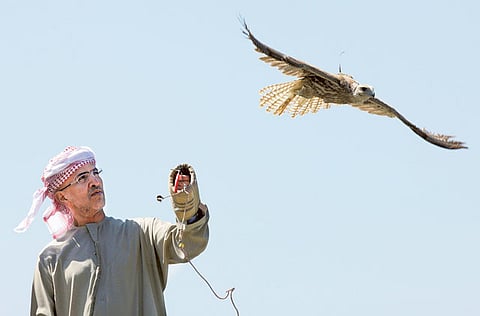93 UAE falcons released into the Kazakhstan wild
Shaikh Zayed Falcon Release Programme uses cutting-edge technology to study creatures’ migration patterns

Abu Dhabi: Ninety-three falcons were released into the wild in Kazakhstan this year as part of the Shaikh Zayed Falcon Release Programme (SZFRP). This now means that a total of 1,554 of the culturally emblematic birds have been released since the programme started in 1995. Under the patronage of President His Highness Shaikh Khalifa Bin Zayed Al Nahyan, the initiative is now in its 19th successive year and indications are that the numbers of falcons in the wild are growing as a result of the work being done by Abu Dhabi to restore a bird crucial to local heritage.
Speaking following this year’s release, Mohammad Al Bowardi, managing director of the Environment Agency Abu Dhabi (EAD) said: “In the words of our father, the late Shaikh Zayed, ‘Our ancestors left us a legacy of traditions we are proud of. Our mission is to maintain and develop them as assets of the nation for future generations’. Abu Dhabi’s work to preserve this cultural icon is both unified and international and reflects our commitment in making a real difference to both global conservation and for the preservation of our culture.”
The release which was carried out through May 16 to 18 of this year included a total number of 46 Peregrine falcons (Falco peregrinus) and 47 Saker falcons (Falco cherrug) which were released in Kurchum, eastern Kazakhstan, for the fifth consecutive year.
The Republic of Kazakhstan is an ideal location to release falcons due to the availability of the prey essential for falcons to breed and prosper in addition to mountains and plains situated within the falcons’ migration range.
Out of the 93 falcons, 5 Peregrine falcons and 5 Saker falcons were fitted with solar battery-powered satellite transmitters to monitor their flight paths and to gather scientific data about their survival rates. The programme uses cutting-edge technology to study the migration patterns of falcons, which inform the breeding and releases of falcons to provide a better chance for the birds’ survival. On-site observation and continuous monitoring through SZFRP have indicated the programme is increasing the number of falcons in the wild in Kazakhstan.



